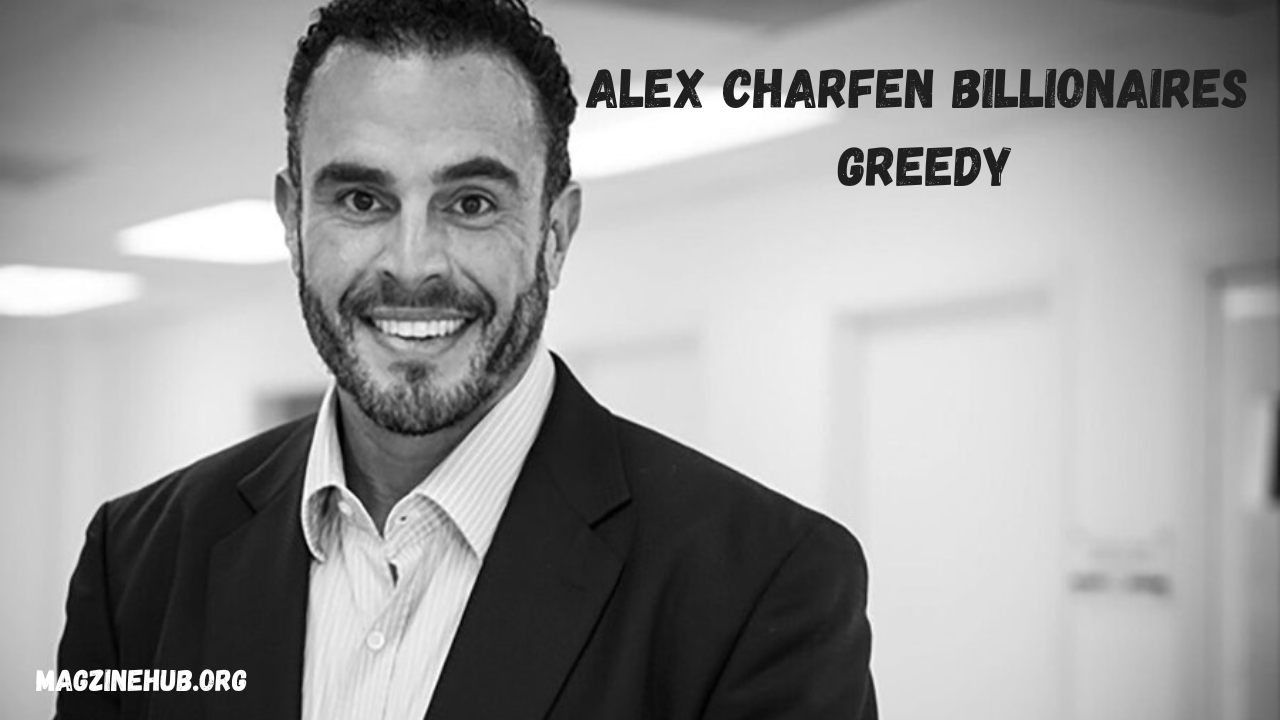Alex Charfen: Are Billionaires Greedy?
Alex Charfen, a prominent entrepreneur, author, and business consultant, has been a vocal advocate for entrepreneurship, leadership, and personal development. He’s best known for his insights into what it takes to succeed in business and his work in helping struggling entrepreneurs regain momentum. One topic that has often stirred debate, both within the entrepreneurial community and society at large, is the role of billionaires in the world economy. This raises an intriguing question: Are billionaires inherently greedy?
In this blog, we will explore Alex Charfen’s perspectives on wealth creation, the perception of billionaires in society, and the arguments for and against the idea that billionaires are greedy. We’ll also delve into the broader economic, social, and philosophical aspects of wealth accumulation. By the end, we hope to gain a nuanced understanding of the nature of wealth and the role billionaires play in modern capitalism.
Understanding the Mindset of Billionaires
Alex Charfen’s Philosophy on Entrepreneurship and Wealth
Alex Charfen has often emphasized the importance of purpose-driven entrepreneurship. For Charfen, wealth is not merely a matter of personal gain but a means to solve problems, innovate, and create value in the world. In his teachings, he argues that true entrepreneurs are driven by a desire to improve the world around them, not by greed or selfishness.
Charfen’s work with entrepreneurs revolves around helping them find their unique abilities and passions. He encourages them to focus on building businesses that align with their values and contribute to society. In this framework, wealth is a byproduct of creating real solutions to real problems, not something to be pursued for its own sake.
This perspective sheds light on how many successful entrepreneurs and billionaires may view their wealth. Rather than being driven by a desire for personal accumulation, they see money as a tool to achieve broader goals. For these individuals, the creation of wealth is intertwined with a sense of responsibility to society.
The Entrepreneurial Journey: Risk, Reward, and Sacrifice
The journey to becoming a billionaire often involves considerable risks, sacrifices, and relentless hard work. Many billionaires, including tech titans like Elon Musk, Jeff Bezos, and Bill Gates, started from modest beginnings, investing everything they had into their ventures. For some, the pursuit of innovation and improvement has been so all-consuming that financial success was merely a result of solving significant problems.
Billionaires often operate within a high-stakes environment, where they must constantly push the boundaries of technology, finance, and innovation. Many invest their time and resources into building companies that employ thousands of people, create new markets, and advance human progress. In this sense, the rewards they reap are not necessarily a reflection of greed, but of their ability to create and sustain significant value in society.
Why Are Billionaires Viewed as Greedy?
The Wealth Gap: Income Inequality and Public Perception
One of the primary reasons billionaires are often viewed as greedy is the growing wealth gap between the richest individuals and the rest of society. In recent decades, income inequality has reached alarming levels, with the top 1% controlling a significant portion of the world’s wealth. This disparity has led to widespread resentment and a perception that billionaires are hoarding wealth at the expense of the majority.
For many people, the idea that one individual could possess more wealth than entire countries seems inherently unjust. This is particularly true when we consider that many workers around the world struggle to make ends meet, while billionaires amass fortunes that they may never be able to spend in their lifetimes.
Critics argue that billionaires are the beneficiaries of a rigged system, where wealth begets wealth, and opportunities are disproportionately distributed to those at the top. They claim that the concentration of wealth in the hands of a few individuals undermines democracy and leads to greater social and economic instability.
Taxation and Wealth Hoarding
Another factor that contributes to the perception of billionaires as greedy is the issue of taxation. Many critics argue that billionaires do not pay their fair share of taxes, often using loopholes and offshore accounts to minimize their tax liabilities. This practice, while legal in many cases, is seen by some as a form of greed, as it allows billionaires to retain more of their wealth while the burden of funding public services falls on the middle and lower classes.
High-profile billionaires like Warren Buffett and Bill Gates have publicly called for higher taxes on the wealthy, acknowledging that the current system is flawed. However, the broader public perception remains that billionaires are often more interested in protecting their wealth than contributing to the common good.
The Role of Capitalism and Market Dynamics
Capitalism, as an economic system, incentivizes wealth creation through competition, innovation, and efficiency. In this system, those who can create the most value, often in the form of new products, services, or technologies, are rewarded with financial success. Billionaires, in many cases, are simply the most successful participants in this system.
However, critics of capitalism argue that it inherently leads to the concentration of wealth in the hands of a few individuals, while leaving many others behind. They claim that the system rewards those who are already wealthy, creating a cycle where the rich get richer and the poor get poorer.
This critique of capitalism is often tied to the idea that billionaires are greedy because they are able to accumulate vast amounts of wealth while others struggle to survive. The argument is that the system allows billionaires to extract value from society without necessarily giving back in proportion to what they take.
Arguments in Defense of Billionaires
Billionaires as Job Creators and Innovators
One of the strongest arguments in defense of billionaires is their role as job creators and innovators. Many of the world’s most successful companies, from Amazon to Tesla, were founded by individuals who became billionaires by providing valuable products and services. These companies employ millions of people around the world, contributing to economic growth and development.
In this sense, billionaires can be seen as catalysts for progress. They drive technological advancements, create new industries, and provide opportunities for others to succeed. The wealth they accumulate is a reflection of the value they have created for society.
Furthermore, many billionaires are actively involved in philanthropic efforts, using their wealth to address some of the world’s most pressing problems. Bill Gates, through the Bill and Melinda Gates Foundation, has donated billions of dollars to global health initiatives, while Elon Musk has invested in renewable energy and space exploration. These efforts demonstrate that wealth can be used for the greater good, rather than for personal gain.
The Philanthropic Billionaire: Giving Back to Society
While the perception of billionaires as greedy persists, many have chosen to dedicate substantial portions of their wealth to charitable causes. Bill Gates and Warren Buffett, for example, founded the Giving Pledge, a commitment by the world’s wealthiest individuals to give away the majority of their fortunes to philanthropic causes during their lifetimes.
Other billionaires, such as Mark Zuckerberg and Priscilla Chan, have pledged to use their wealth to address issues like education, healthcare, and social justice. These efforts challenge the notion that billionaires are solely interested in accumulating wealth for themselves and suggest that many are motivated by a desire to make a positive impact on the world.
The Concept of Wealth as a Tool for Change
For some billionaires, wealth is not an end in itself but a means to effect change on a larger scale. Alex Charfen’s philosophy aligns with this idea, as he advocates for entrepreneurs to use their unique abilities to solve problems and create value in the world. In this context, wealth is viewed as a tool for achieving greater goals, such as advancing technology, improving public health, or addressing environmental challenges.
From this perspective, billionaires are not greedy for amassing wealth, but rather for using their resources to pursue ambitious projects that benefit society. Elon Musk, for example, has stated that his wealth is intended to fund his vision of making humanity a multi-planetary species. This type of thinking suggests that the accumulation of wealth can be driven by a sense of responsibility to future generations rather than personal greed.
Conclusion: Are Billionaires Greedy?
The question of whether billionaires are greedy is complex and multifaceted. While it is easy to point to the growing wealth gap and the concentration of resources in the hands of a few as evidence of greed, the reality is more nuanced. Billionaires like Alex Charfen, Bill Gates, and Elon Musk often view wealth as a tool for solving problems, advancing innovation, and improving society.
Critics argue that billionaires benefit from an unfair system that allows them to accumulate wealth at the expense of others. However, defenders of billionaires point to their role as job creators, innovators, and philanthropists who contribute to economic growth and address global challenges.
Ultimately, the answer to whether billionaires are greedy depends on how we define greed and how we view the role of wealth in society. If greed is defined as an excessive desire for wealth, then some billionaires may indeed fit that description. However, if wealth is seen as a tool for creating positive change, then billionaires can be viewed as essential players in the pursuit of progress and innovation.
In Alex Charfen’s worldview, entrepreneurs and billionaires are not driven by greed but by a desire to make the world a better place. This perspective challenges the popular narrative and invites us to rethink our assumptions about wealth and its role in society.







